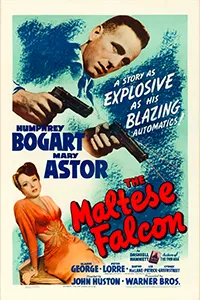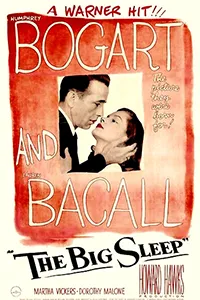DOUBLE INDEMNITY
Double Indemnity is a classic film noir directed by Billy Wilder and released in 1944. The movie follows the story of an insurance salesman named Walter Neff (played by Fred MacMurray) who becomes involved in a dangerous affair with Phyllis Dietrichson (played by Barbara Stanwyck), the wife of one of his clients. Together they plot to kill her husband and make it look like an accident to collect the insurance payout. However, things start to unravel as their plan goes awry and an investigation by the insurance company’s claims adjuster (played by Edward G. Robinson) begins to reveal the truth. The film is known for its sharp dialogue, complex characters, and suspenseful plot, and is considered a classic of the film noir genre.

Director: Billy Wilder
Year: 1944
Stars: Fred MacMurray, Barbara Stanwyck, Edward G. Robinson
Awards: Nominated for 7 Oscars
PLOT
The movie opens with Walter Neff (played by Fred MacMurray), an insurance salesman, arriving at the office of the Pacific All-Risk Insurance Company late at night. He begins dictating into a dictaphone, narrating the events that led to his current situation. Neff then proceeds to tell his story, beginning with a fateful meeting with Phyllis Dietrichson (played by Barbara Stanwyck), the wife of one of his clients.
Neff is immediately taken by Phyllis’s beauty and charm, but he soon discovers that she is unhappy inher marriage and is looking for a way out. Phyllis tells Neff that her husband has taken out a life insurance policy with a “double indemnity” clause, which means that if her husband dies in an accident, the payout will be doubled. Phyllis proposes that she and Neff carry out the perfect murder and make it look like an accident so they can collect the insurance payout.

Neff is initially reluctant, but he becomes increasingly obsessed with Phyllis and the idea of getting rich quick. They eventually carry out the murder, but things quickly start to go wrong. Neff’s colleague and friend, Barton Keyes (played by Edward G. Robinson), an insurance investigator, begins to suspect foul play and starts to dig deeper into the case.
As the investigation progresses, Neff and Phyllis’s relationship becomes strained, with each of them suspecting the other of betrayal. The tension comes to a head in a dramatic and violent climax, as Neff and Phyllis face the consequences of their actions.
Throughout the film, the dialogue is sharp and witty, with each character playing off the other in a game of cat-and-mouse. The performances by MacMurray, Stanwyck, and Robinson are all outstanding, with each actor bringing their character to life with nuance and complexity.
THEMES
The movie explores themes of greed, lust, betrayal, and the corruptibility of the human soul.
One of the central themes of “Double Indemnity” is greed. Walter Neff, the protagonist, is initially portrayed as a hard-working, honest insurance salesman who takes pride in his job. However, he becomes increasingly consumed by his desire for wealth and luxury, which leads him to become complicit in the murder of Phyllis’s husband. The film depicts how the lure of money can corrupt even the most decent and principled individuals, leading them down a path of destruction.

Another prominent theme in the film is lust. Phyllis Dietrichson is a femme fatale, a character archetype common in film noir, who uses her beauty and charm to manipulate men for her own purposes. Neff is immediately smitten by Phyllis and is willing to do anything to win her affection, including murder. The film portrays how unchecked desire can lead people to commit terrible acts and destroy their own lives in the process.
Betrayal is another major theme in “Double Indemnity.” Phyllis’s husband trusts Neff and even confides in him about his marital problems, unaware that Neff is secretly having an affair with his wife. Neff’s betrayal of his friend and colleague, Barton Keyes (played by Edward G. Robinson), is also a significant plot point, as Keyes becomes increasingly suspicious of Neff’s involvement in the murder. The film depicts how trust and loyalty can be easily broken, leading to tragic consequences for all involved.
Finally, “Double Indemnity” explores the corruptibility of the human soul. The film suggests that no one is truly immune to the temptations of greed and lust, and that anyone can be pushed to commit immoral acts under the right circumstances. Neff and Phyllis are both portrayed as flawed individuals who are capable of both good and evil, and their actions have devastating consequences for themselves and those around them.
In conclusion, “Double Indemnity” is a complex and thought-provoking film that explores themes of greed, lust, betrayal, and the corruptibility of the human soul. The film’s characters are flawed and morally ambiguous, and their actions reflect the darker aspects of human nature. “Double Indemnity” remains a classic of the film noir genre and a testament to the enduring power of storytelling to illuminate the complexities of the human experience.
POPULAR CULTURE
Over the years, “Double Indemnity” has become a cultural touchstone, and its influence can be seen in various films, TV shows, and other media. Here are some examples:
The film “Body Heat” (1981) is often cited as a modern-day retelling of “Double Indemnity.” Like the earlier film, it involves a man who becomes entangled with a dangerous woman and gets drawn into a murder plot.
In the TV show “The Simpsons,” there is an episode called “Double, Double, Boy in Trouble” (2007) that references “Double Indemnity” in its title and plot. In the episode, Bart and Lisa suspect that their babysitter is trying to murder their parents for the insurance money.
The song “Phyllis” by the band Let’s Active references the character of Phyllis Dietrichson in its lyrics.
In the film “Basic Instinct” (1992), Sharon Stone’s character is often compared to Phyllis Dietrichson for her seductive and dangerous nature.
The video game “LA Noire” (2011) features a case called “The Silk Stocking Murder,” which is heavily inspired by “Double Indemnity.” The case involves a murder-for-insurance plot and a femme fatale who tries to manipulate the main character.
Explore more Film Noir

A film noir about a man’s affair gone wrong, directed by Fritz Lang.

A legendary film noir featuring Humphrey Bogart as a private detective caught up in a deadly game of deception and greed.

This classic film noir follows private detective Philip Marlowe as he investigates a complex case involving a wealthy family.